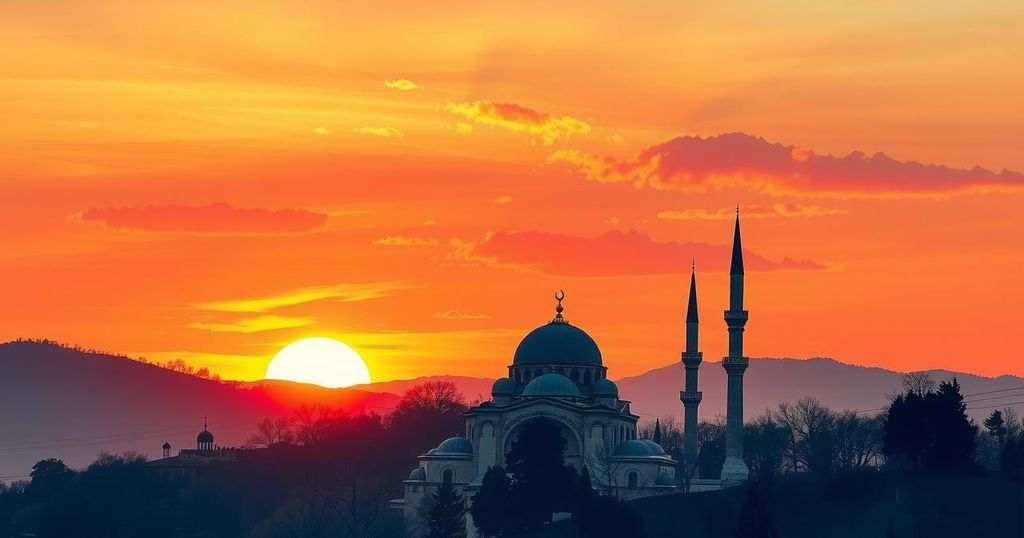Russia and Ukraine Set for Crucial Peace Talks in Turkey Amid Tensions
Ukraine and Russia are set to resume peace talks in Turkey, with Volodymyr Zelensky insisting on meeting with Vladimir Putin directly. Despite calls for an unconditional ceasefire, Russia’s demands challenge Ukraine’s sovereignty. Skepticism surrounds the talks as significant disagreement persists, but former President Trump’s possible attendance adds an element of unpredictability. The discussions occur after years of conflict and numerous failed negotiations, with many analysts doubtful about a fruitful outcome this time around.
Tensions remain high as peace talks between Russia and Ukraine are set to take place in Turkey, as the two nations attempt to reconcile stark differences after years of conflict. Ukrainian President Volodymyr Zelensky has publicly declared his intention to meet Russian President Vladimir Putin during the discussions, though he has made it clear he will not engage with lower-level officials from Moscow. The talks are scheduled to commence in Istanbul on Thursday.
Zelensky, expressing optimism, stated on social media that he will be present in Turkey for the crucial negotiations. He also welcomed the possibility of former U.S. President Donald Trump attending, suggesting that Trump’s involvement could positively influence outcomes. During a brief video statement, he said, “I have openly said that I am ready for a meeting. I will be in Turkey. I hope that the Russians will not avoid this meeting.” His statements have underscored the urgency for direct engagement between the two leaders.
Despite the push from Ukraine for an unconditional ceasefire, Moscow remains steadfast on its demands, which critics argue undermine Ukrainian sovereignty. The Kremlin recently confirmed its participation in the upcoming talks in Turkey, following weeks of heightened confrontations. Kremlin spokesman Dmitry Peskov referred to the negotiations as a chance for a long-term peaceful settlement but would not confirm Putin’s attendance, declining to detail who would represent Russia at the meeting.
This summit has been spurred by heightened diplomatic activity, notably with Trump hinting at his attendance while en route to the Middle East. Putin’s previous declarations about pursuing a peace deal further complicate the scenario, especially given Zelensky’s insistence that discussions can only involve Putin himself. Chief of Staff Andriy Yermak emphasized that failure of Putin to show up would signal Russia’s lack of interest in a peaceful resolution, stating, “If Vladimir Putin refuses to come to Turkey, it will be the final signal that Russia does not want to end this war.”
Separate discussions between Ukraine and Russia have occurred this year, led by Zelensky’s aides and Russia’s Foreign Minister Sergey Lavrov. However, these meetings have yet to yield any significant progress towards a ceasefire. Lavrov, while a veteran diplomat, reportedly does not hold sway over the Russian president’s decisions regarding Ukraine, potentially limiting the effectiveness of any negotiations he might lead.
President Erdogan of Turkey has reached out to both Zelensky and Putin, expressing the belief that a new opportunity for peace negotiations has surfaced. He noted that previous talks held in Turkey came close to achieving a breakthrough, highlighting the precarious nature of diplomatic efforts between the two nations since Putin’s initial invasion in 2014. Yet, skepticism pervades this latest round of discussions, as fundamental disagreements remain.
Few analysts predict a successful outcome from the forthcoming negotiations. Putin’s demands include demilitarization of Ukraine, renouncing NATO membership, and recognition of Crimea as part of Russia, demands that Ukraine and its allies consider non-starters, fearing such actions would drastically compromise Ukraine’s sovereignty. Further complicating matters, Western partners, including the UK, insist on a ceasefire before any agreements are formalized, threatening more sanctions should Russia refuse.
These peace talks in Istanbul mark another attempt to address the ongoing hostilities; however, past efforts have frequently concluded without agreements. The previous talks in Turkey fell apart in March 2022, underscoring the difficulties facing diplomatic interventions amidst years of conflict. Only time will tell if this latest engagement can change the course of events in this long-standing dispute.
The upcoming peace talks in Turkey reflect ongoing efforts to find resolution amid a prolonged conflict between Ukraine and Russia, with deeply entrenched positions making the outcome uncertain. While both sides display a readiness to discuss, irreconcilable differences persist, particularly regarding sovereignty and military demands. The international community is closely monitoring the negotiations, hopeful yet wary of the potential for meaningful progress, given the complex history of failed talks in the past.
Original Source: www.independent.co.uk




Post Comment